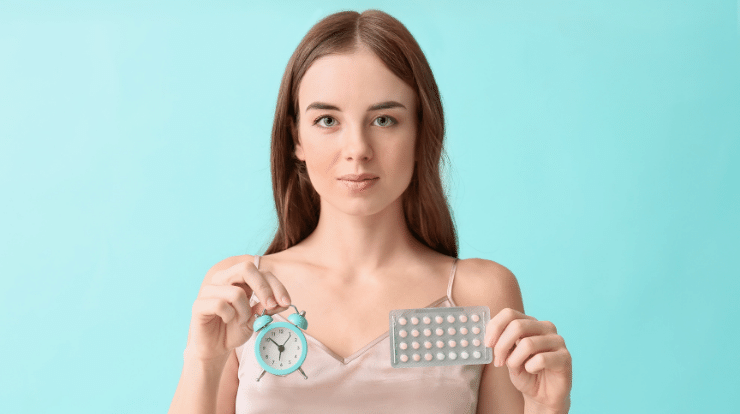
What is the Second Trimester of Pregnancy (14 to 26 Weeks):
The second trimester of pregnancy starts from week 14 to 26, or between months 4, 5, and 6. It’s a phase when you may start to get symptoms of morning sickness and back pain and you’re likely to notice your baby move around for the first time.
The second trimester is usually when many expectant mothers start to feel better. Your second trimester is an important time because it is when many women begin to feel more energetic and are more productive in enjoying their pregnancy while they can. Take advantage of your current state by planning ahead for the arrival of your newborn!
What are the symptoms of the second trimester of pregnancy?
During the second trimester of pregnancy, some may experience physical changes, including:
1. Growing belly and breasts:
Growing a baby is always a lovely experience. Your body will go through changes you may find inconvenient, but it’s just the way things happen when life is growing inside of you. It’s important to wear a supportive bra with wide straps or a sports bra.
2. Braxton Hicks contractions:
Your body is experiencing second-trimester pregnancy contractions. In other words, your body is tightening and loosening your abdomen muscles quite regularly throughout the day by itself. If these mild regular contractions persist and then become stronger and more frequent, as well as occur all of the time, it could be a sign that you’re getting closer to delivering your child.
3. Skin changes:
During the second trimester of pregnancy, you may notice a few changes to your skin as there are some hormonal changes happening that cause an increase in pigment-bearing cells in that region. As a result, women can commonly experience brown patches and dark lines on their faces (like around their cheeks) and also down their bellies (sometimes referred to as the “linea nigra”), even reddish-brown, black, silver, or purple lines along the abdomen.
These skin changes are common and usually go away after delivery but failing this might end up getting worse if you spend some of your time during one of these days sunbathing – so we suggest applying an adequate amount of sunscreen while outdoors to prevent it from worsening.
4. Nasal problems:
Nose bleeds and nasal problems are some of the most common ailments that occur during the second trimester of pregnancy. During this time, your body goes through dramatic changes which can cause discomfort as your new baby grows inside you.
Due to hormonal changes and increased blood circulation, it’s not uncommon to experience additional mucus in the nose, so incidences of stuffiness and nosebleeds become more prevalent. You can help relieve this by using saline drops or a saline rinse, then staying hydrated with plenty of fluids such as water or herbal tea. It is also recommended by many women that a humidifier be used to remove excess dry air from your home when possible so as to prevent further mucous buildup.
5. Dental issues:
Becoming pregnant can cause a woman to experience gum irritation and, even worse, frequent vomiting. Flossing her teeth gently along with switching toothbrushes should help alleviate this problem. If there is not enough saliva available in the mouth, the cells that make up tooth enamel may be unable to properly finish development making them more vulnerable to decay. Therefore, brushing daily and visiting the dentist regularly while pregnant is very important.

6. Dizziness:
Getting pregnant is exhausting, but it’s important to make sure you’re staying hydrated and taking regular breaks to move around. It’s possible that you could get dizzy while at work and it might seem uncomfortable, especially if you’re experiencing some early pregnancy symptoms.
7. Leg cramps:
As your pregnancy continues, you may be suffering from some uncomfortable and embarrassing side effects like leg cramps. Over time these will lessen as your body and baby get ready for the big day. Stretching before bedtime is an easy way to ward off leg cramps since they often strike at night.
It also helps to drink plenty of fluids, stay active physically and take steps when possible to reduce swelling in your legs, which may help too! If a leg cramp does strike, try rubbing it with a warm shower or warm water massage. This can release tension in the affected area and relax it thereby alleviating pain. Never stretch so hard that you cause lingering soreness because you are working out muscles that aren’t yet prepared to handle the force of stretching.
8. Vaginal discharge:
Your discharge may be sticky, clear, or white, and that’s absolutely normal. Contact your health care provider if you notice a sour smell to it, or if the color is different than how you usually see it. Sometimes this can mean an issue with yeast, bacterial overgrowth, or other vaginal infections.
9. Urinary tract infections:
If you’re pregnant or considering pregnancy in the future, take notice because urinary tract infections are quite common during these situations. Urinary tract infections (UTIs) can occur when bacteria from the bowel or other parts of the body travel into your urethra and up into your bladder. When you contract a UTI, it’s important to visit your care provider immediately because without treatment you may develop other complications like kidney infections, which can lead to permanent kidney damage!
What to eat during the second trimester of pregnancy?
During the second trimester, it’s recommended that you eat a balanced diet. The following nutrients are the most important during pregnancy:
1. Iron:
Iron helps to carry oxygen around the body. During pregnancy, iron helps to keep the mother healthy from getting anemia during her pregnancy, which could cause complications during the birth of her child. Premature babies are at higher risk for health complications because their bodies aren’t developed enough yet for breathing outside the uterus or fighting off infections or illnesses.
By maintaining a healthy diet with an adequate intake of iron, one may decrease chances of contracting anemia and reduce their loved one’s chances of accompanying them at a maternity ward after giving birth. Anemia is caused when our red blood cell count drops below normal levels, resulting in an inadequate supply of oxygen-rich blood being sent to vital organs and body systems.
The recommended daily iron intake for pregnant mothers is 27 milligrams of iron per day.
Pregnant women should be aware that iron sources can be found in:
- Nuts
- beans and lentils
- leafy green vegetables
- cooked seafood
- lean meat
- grains, including bread and oatmeal
- fortified breakfast cereals
2. Protein:
During pregnancy, women should consume 1.52 grams of protein per kilogram of body weight each day – to help the baby’s brain and other organs develop. For example, a woman who weighs 175 pounds would strive to eat 1.52g of protein each day.
sources of protein include:
- beans, lentils, and peas
- eggs
- fish (cooked, not raw)
- lean meats
- nuts
- tempeh and tofu
3. Calcium:
During pregnancy, women should consume 1,300 mg of calcium daily. Calcium helps the baby’s bones and teeth develop and plays a role in the smooth running of the muscles, nerves, and circulatory system.
4. Folate:
Folate is a B vitamin that can only be found in foods, such as dark leafy greens and sometimes orange juice. Even though your body may not have the ability to absorb it from synthetic brands like folic acid, there are still many benefits to taking prenatal vitamins full of folate during pregnancy. It helps prevent neural tube defects including spina bifida and reduces the risk of premature labor by preventing pre-term contractions. In addition, an analysis of 18 studies has also suggested that folic acid significantly decreases the risk of congenital heart defects as well.
best sources include:
- fortified cereals
- black-eyed peas
- rice
- oranges
- dark green leafy vegetables (spinach, cabbage, and collard greens)
5. Vitamin D:
Vitamin D helps babies develop strong bones and teeth in the second trimester of pregnancy. The recommended intake during pregnancy is 600 International Units (IU) a day. Vitamin D is produced naturally by the body with exposure to sunlight, so many adults can get enough vitamin D through normal activities like taking walks outside. Unfortunately, estimates suggest that more than 40 percent of adults in the United States suffer from vitamin D deficiency due to limited exposure to sunlight and other factors!
sources of vitamin D include:
- egg yolks
- UV-exposed mushrooms
- Cheese
- fish liver oils
- beef liver
- fortified juices
- salmon, fresh tuna, and mackerel
6. Omega-3 fatty acids:
Fish oil contains omega-3, a terrific source of antioxidants that can preserve cell health as well as combat early aging. This benefit is especially vital for expectant mothers, who should eat fish (or take supplements) at least two times each week to ensure that their morning sickness doesn’t call for their monthly infant’s wellbeing. Fish oil can also help prevent postpartum depression and make sure the brain, heart, and eyes function correctly in newborns.
Sources of Omega-3 fatty acids in:
- chia seeds
- fish oil
- flaxseeds
- mackerel, fresh tuna, herring, and sardines
7. Fluids:
People who are pregnant need to keep themselves hydrated more so than those who are not. Drinking enough water before, during and after the pregnancy can prevent complications like neural tube defects, low breast milk production, or swelling in the mother’s hands and feet (preeclampsia). Water helps form the placenta, umbilical cord, and amniotic sac that supports your baby. If a woman doesn’t get enough water while pregnant, she may have trouble breastfeeding or may not have enough amniotic fluid to protect her unborn child.
What happens in the second trimester of pregnancy?
During the second trimester, a baby’s organs become fully developed. By this time, it can also hear and swallow. Small hairs can be seen from the outside even though they are just as soft as down feathers. During this period, the baby will begin to move around in preparation for life in the outside world and begin developing sleep and waking cycles that mother nature dictates. At the end of the second trimester, a child will usually grow between 13 and 20 centimeters in length according to Baby Med, and in terms of weight gain more than double its initial size due to increased fat deposits.
What to do in the second trimester of pregnancy?
- Drink lots of water
- Eat enough calories (about 300 calories)
- Keep your gums and teeth healthy
- Exercise regularly
- do Kegel exercises
- Eat fruits, low-fat forms of protein, vegetables, low-fat forms of protein
- Fibre
What causes dizziness in the second trimester of pregnancy?
You may feel dizzy if your growing uterus presses on your blood vessels. This can happen around the second trimester and is more common when the baby is large. When you are lying down, try to do so in a variety of positions and not just on your back. Avoid lying flat on your back as it can cause an imbalance in blood flow towards the heart which you will want to prevent if possible since it could result in other symptoms such as dizziness that you wouldn’t want to deal with.
What causes headaches during the second trimester of pregnancy?
Pregnancy can cause many of your body parts to swell up, which can be an uncomfortable symptom. However, headaches are not always as benign a symptom as they seem. This can be a sign of high blood pressure and this is one ailment that you should definitely discuss with your doctor. From the 20th week of pregnancy, about 6 to 8% of pregnant women in the US are affected by hypertension.
Telling your doctor, the symptoms you’re experiencing will help them make the proper diagnosis – and if extreme hypertension is the case, early treatment may help protect you and your little one from its most severe effects on both health and well-being. Unfortunately, some pregnant mothers with hypertension don’t know they have it – a common problem among young and middle-aged women that could lead to complications for both mother and child.

What causes bleeding in the second trimester of pregnancy?
It’s perfectly normal to bleed or spot during your second trimester. That’s because intercourse with a partner and vaginal exams can lead to slight bleeding, causing light pink or brown discharge to seep through. Brownish discharge in the third trimester correlates with how dilated you are. As your cervix starts thinning out and dilating, it will allow for more blood flow.
Is it safe to travel in the second trimester of pregnancy?
In most cases, yes, traveling is safe in the second trimester of your pregnancy. However, if you’re traveling by air, it’s best to check with your doctor first. Travel during pregnancy is a tricky thing. With some airlines requiring you to travel in your second trimester and others not allowing you to travel until your third trimester, you may be left wondering if it’s truly safe to travel in the second trimester.
The first trimester is typically the riskiest time to travel as it’s when you’re most at risk of miscarriage. The second trimester of pregnancy is the safest time to travel, however, you should always check with your doctor before taking a trip.
Can you have a miscarriage in the second trimester of pregnancy?
Miscarriage in the second trimester of pregnancy can come about in one of two ways: a very premature delivery or a fetal demise. In around 2-3% of pregnancies, it occurs during this period, which is significantly less frequent than the first trimester. Only about 0.5% of pregnancies will result in a fetal demise by the time it’s reached 20 weeks gestation.
Can you swim in the second trimester of pregnancy?
The second trimester provides an excellent opportunity to practice swimming, provided that it is a form of exercise that has been approved by your doctor. Exercise for at least 30 minutes per day, two or three times each week. However, occasionally you will have days when simply walking around the house can cause you discomfort.
The important thing is not to guilt yourself for having imperfect days; you must listen carefully to your body and baby in this regard. Not everyone’s body heals the same way or nurtures a baby in the same manner either. Swimming offers an excellent opportunity to soothe your body and mind, as well as provide an activity you can enjoy with friends or your significant other!






